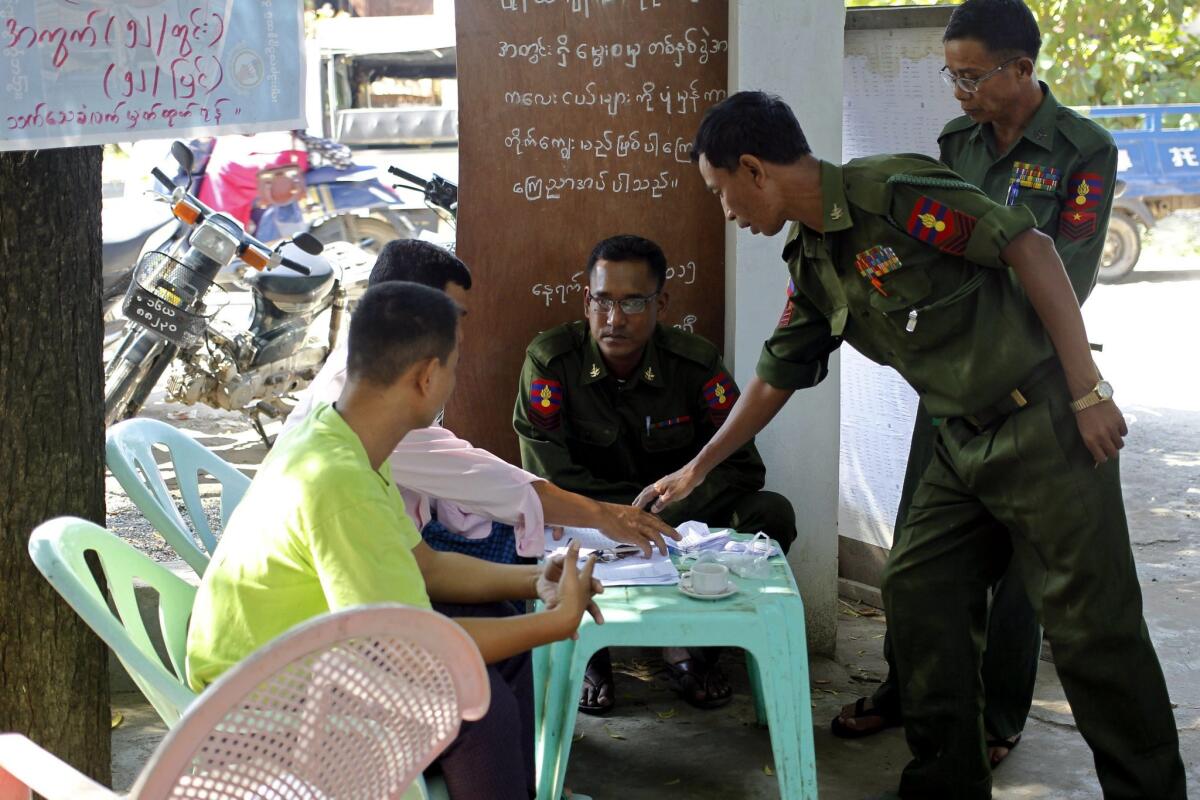Editorial: Myanmar set to vote, but it won’t be truly free and fair

Staff members of a polling station (L) assist Myanmar soldiers to check names on the final voter list during early voting in Mandalay on November 4.
- Share via
In three days, Myanmar will hold its first democratic national election in 25 years — a historic moment for a country that has transformed itself from a military dictatorship, isolated from the West, to a quasi-civilian government embraced by the Obama administration for its progress toward democracy. Along the way, the government wrote a new constitution, freed more than 1,000 political prisoners and released opposition leader Aung San Suu Kyi, the Nobel Peace Prize laureate, from years of house arrest. In a much smaller by-election in 2012, she won a seat in parliament.
But this is not a truly free and fair vote. Of the 664 seats in parliament, a quarter are reserved for military officials. The constitution also states that no president may have a spouse or children who are foreign citizens, a provision widely considered to be aimed at preventing Suu Kyi from becoming president. She is the widow of a British national and has two sons with foreign passports. If her party were to win a majority, she could not be chosen as president. (The president is selected by the parliament.)
While there have been plenty of campaign rallies, candidates are not allowed to criticize the military on state-run media. Two activists were arrested for posting satirical material online. The government’s election commission has canceled balloting in more than 400 villages without clearly explaining its reasons, according to the Carter Center, which has been monitoring the campaign.
And the government has rescinded the right to vote of thousands of ethnic minorities. Most of the disqualified were Rohingya Muslims, who have long faced persecution. An ultranationalist, anti-Muslim movement in this majority Buddhist country has only gained more attention as the election nears.
The election will not be free, fair and inclusive; that’s a given. But the U.S. and the numerous outside observers, including dozens from the Carter Center, should do what they can to ensure that irregularities are minimized, that democracy is maximized and that the voting is secure and peaceful.
Once the election is over, the U.S. should reiterate that, in exchange for continuing diplomatic relations, it is imperative that government officials reform the constitution. The military should neither have a right to a quarter of the seats in parliament nor the de facto veto of constitutional amendments that goes with it. Amendments require more than a 75% vote of the parliament. That’s not democracy, and the U.S. should not play along with the pretense that it is.
And it’s past time for the National League for Democracy and its leader, Suu Kyi, to take a stand against Myanmar’s relentless oppression of the country’s Rohingya population. Protecting human rights should be at the heart of their political concerns.
Follow the Opinion section on Twitter @latimesopinion and Facebook
More to Read
A cure for the common opinion
Get thought-provoking perspectives with our weekly newsletter.
You may occasionally receive promotional content from the Los Angeles Times.









